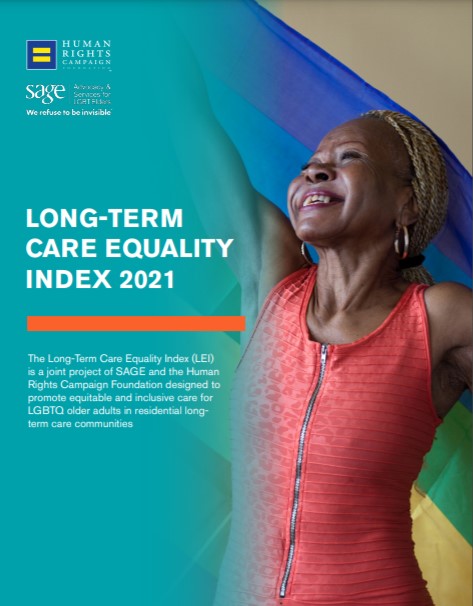Despite significant progress, LGBTQ older adults lack basic legal protections, including equity and inclusion protections in long-term care communities, according to a new national benchmarking tool.
The first edition of the Long-Term Equality Index from elder advocacy group SAGE and the Human Rights Campaign Foundation found the vast majority of communities do not have inclusive resident or employee non-discrimination policies for those who are lesbian, gay, bisexual, transgender or queer.
The initial report also lays out how organizations can improve their policies.
As McKnight’s Senior Living previously reported, the LEI builds on the HRC Foundation’s Healthcare Equality Index, which scores healthcare facilities on their LGBTQ-friendly policies and practices. The LEI measures and benchmarks LGBTQ inclusion in a community’s foundation policies and practices, resident services and support, employee benefits and policies, and resident and community engagement.
According to the new LEI report, of the long-term care communities that had non-discrimination policies, only 36% had LGBTQ-inclusive policies for staff members, and half that percentage had such policies for residents.
LGBTQ individuals lack basic legal protections across the country, according to the report. In recent years, some states — including California and New Jersey — have legislated LGBTQ-inclusivity in long-term care. Those new laws prohibit denial of admission, medical care and reasonable accommodations based on sexual orientation, gender identity and expression, intersex status or HIV status.
Without such protections, long-term care communities must adopt their own non-discrimination policies, which the HRC Foundation and SAGE’s research found rarely happens.
“As this report makes clear, finding inclusive long-term care communities can be especially challenging for LGBTQ older adults and that more long-term care communities need to take the lead on LGBTQ inclusion,” Human Rights Campaign President Alphonso David said.
Equitable and inclusive care in residential communities is vital for LGBTQ elders to thrive in their later years, SAGE CEO Michael Adams said.
According to the report, more than 5% of long-term care residents are LGBTQ, and many live with a “compounded fear” of discrimination and inadequate care based on sexual orientation, gender identity and racial bias.
The LEI encourages communities to adopt policies and best practices that provide culturally competent and responsive care to LGBTQ older adults. Participation can be a multi-step process beginning with signing the LEI Commitment to Caring Pledge indicating the intent to adopt inclusive policies and practices. Residential long-term care communities also have access to a free online self-assessment tool.
After completing the self assessment, each community receives a customized needs-assessment report and access to an LGBTQ aging executive briefing.
Since announcing the LEI in 2019, 78 “Commitment to Caring” pledges have been completed, and 49 communities (63%) have moved to the next step by completing a self-assessment of their LGBTQ inclusive policies and practices, representing 184 communities in 32 states. The types of communities represented include 63 affordable senior housing communities (35%), 53 assisted living facilities (29%), 36 continuing care retirement communities (19%), 18 skilled nursing facilities (10%), 13 independent living communities (7%) and two free-standing hospices (1%).
The next LEI survey will open in fall 2022, with the next edition to be released in 2023.



